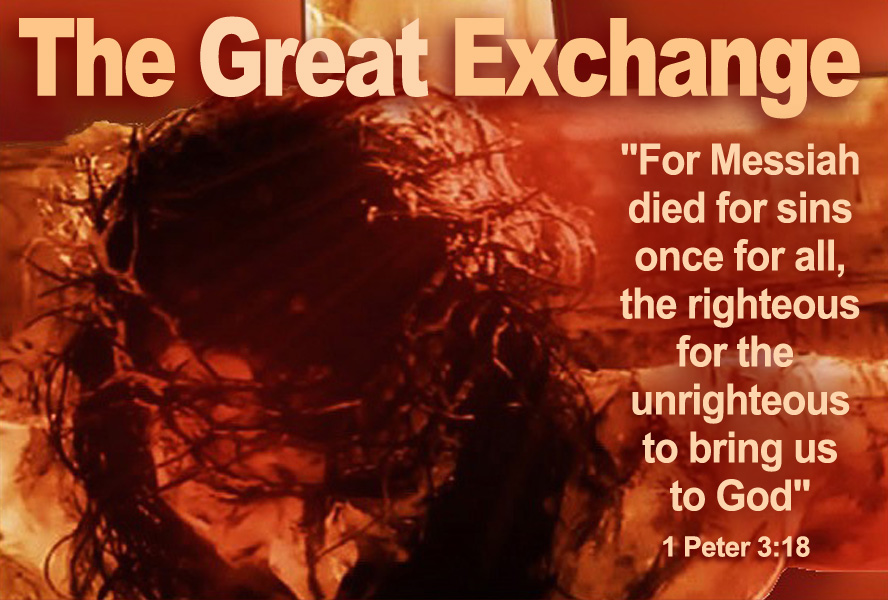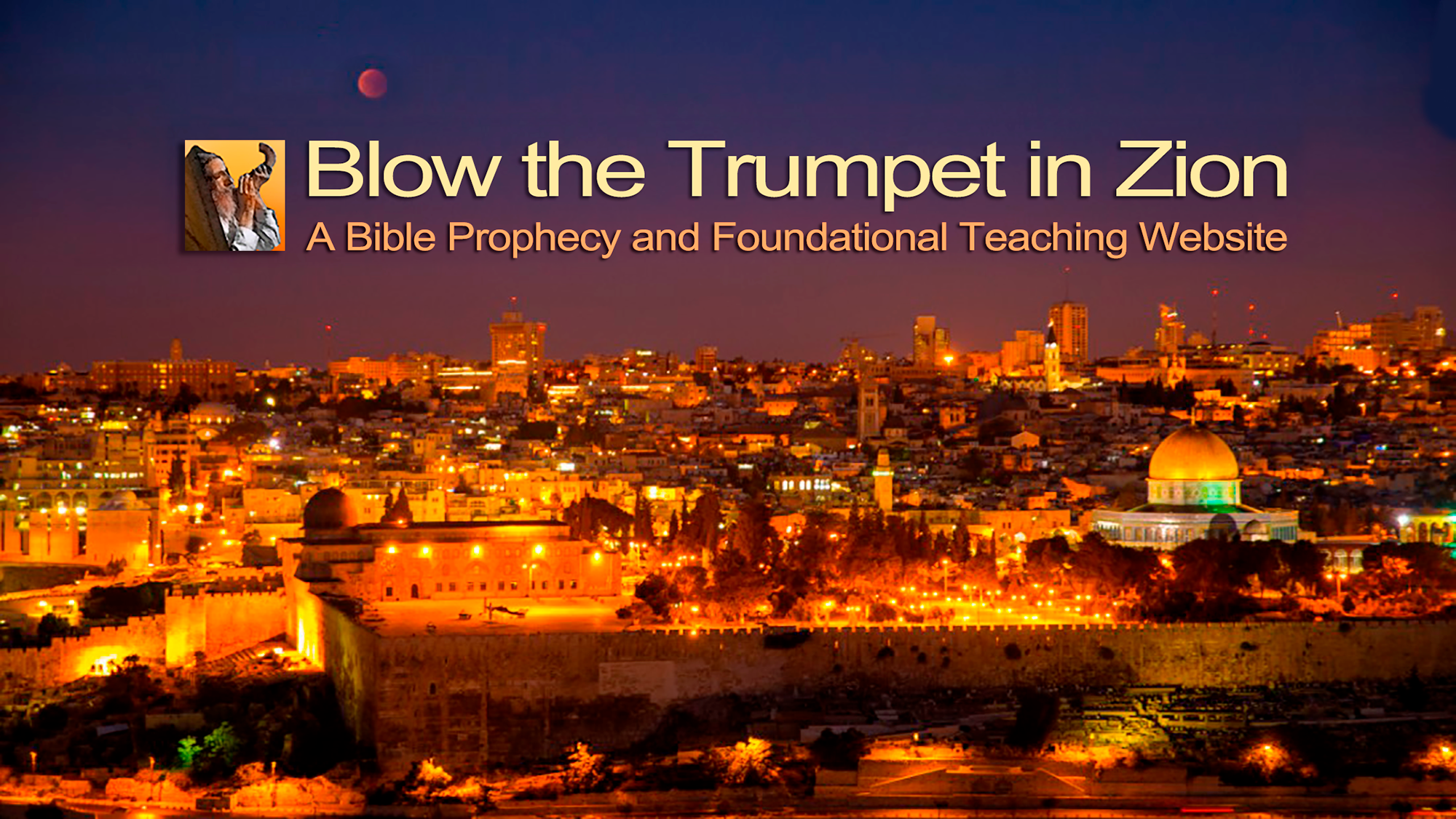
(1 Peter 3:18) “For Messiah died for sins once for all, the righteous for the unrighteous, to bring you (us) to God.”
We could call this text “the Great Exchange” that took place on the cross where God sent His only eternal begotten Son into this world to die in our place and for our sin. He was the one who paid the price for our sin and the one whom God dealt with as a sinner even though the Lord Jesus was without sin that God might adopt us as His sons and daughters, who by nature are great sinners and rebels in His sight, in order that we might be justified by faith in the Messiah our Lord Jesus (Romans 5:1). This was indeed the Great Exchange!
“For Messiah died for sins once for all”
The Lord Jesus’ sacrifice for our sins was a once and for all time sacrifice that was never to be repeated (Hebrews 1:3; 7:27; 9:12, 25-28; 10:12, 18). The author of the Book of Hebrews clearly repudiates the Roman Catholic doctrine of transubstantiation in the Mass where the bread and the wine become the literal body and blood of Messiah and that it is a perpetual sacrifice that must be repeated.
The sacrificial death of the Messiah our Lord Jesus put an end to the need for any more sacrifices and offerings to atone for sins as prescribed in the Old Testament before the incarnation of the Lord Jesus who was the perfect sacrificial Passover Lamb whose pure and untainted blood fully atoned for our sins and cleansed us from them when we were born again. Until the Temple was destroyed in 70AD by the Romans sacrifices for sin continued to be offered in the Temple.
The Judaism practiced today is not the Mosaic Judaism of Moses as taught in the Torah. There is no high priest or a temple. In Israel they do have some bred red heifers which apparently qualify for the animal sacrifices but as yet no temple or high priest. However, when a temple is built and sacrifices and offerings are made they will be an abomination in God’s sight because those offering them up to atone for sin are rejecting the sacrifice made once and for all time by our Great High Priest the Messiah our Lord Jesus.
We do know from the prophets Zechariah and Ezekiel that sacrifices and offerings will be offered up in the Millennial Temple on the original site of Mt Zion when the Messiah our Lord Jesus reigns from Jerusalem, but these sacrifices and offerings will be memorials to what the Lord Jesus accomplished at the cross in the previous age.
Just as the sacrifices and offerings in the Old Testament looked forward to the ultimate sacrifice of the Messiah to come in the future, so In the Millennial kingdom the sacrifices and offerings in the Millennial temple will look back to the ultimate sacrifice that occurred in the past. In the Millennium there will be people born who will need to be taught about what the Lord Jesus did to atone for sin in order to establish the new and everlasting covenant.
In eternity in heaven, where time as we know it down here on earth does not exist, the central focus of worship is the Lamb slain from the foundation of the world standing in the centre of the throne (Revelation 5:6). And then we are told…
“…the righteous for the unrighteous, to bring you (us) to God”
At the cross this great exchange took place. Rabbi the apostle Paul writes; “For He (God) hath made Him (Jesus) to be sin for us, who knew no sin; that we might be made the righteousness of God in Him”(2 Corinthians 5:21). On the cross the Lord Jesus became our substitute and God laid upon Him our sin and its consequences in order that He might bestow on us the righteous nature of the Lord Jesus which is received by faith (Romans 3:22) (Philippians 3:7-9).
God treated the Lord Jesus as a sinner even though by nature He was without sin, that God might treat us as righteous ones even though by nature we are sinners. We could render the text in this way; “He who knew no sin was made to be sin with our sin that we might be made or become the righteous ones with His righteous nature.” Spiritually God credited Jesus righteousness to our account and credited to Jesus our sin.
On the cross the Lord Jesus was separated from God His Father. His eternal relationship to God the Father as God the Son, and being equal with Him in nature, did not change otherwise the Lord Jesus would no longer have been God and equal with God if this was the case. As it is written; “God was in Messiah reconciling the world to himself” (2 Corinthians 5:19).
It was His broken Fellowship with the Father that caused Him to call out “My God, My God, what have You forsaken Me?” His eternal relationship with His Father was not broken but His fellowship with His Father was, as “God cannot look upon sin” (Matthew 27:46) (Psalm 22:1-2, 6-8, 12-21) (Habakkuk 1:13). When the Lord Jesus cried out in agony at His broken fellowship with His Father, God was silent.
This side of eternity no one can really fathom what exactly happened at the cross when we are told that the Lord Jesus became sin with our sin in that He was so disfigured in His physical appearance beyond that of any man and His form marred beyond human likeness, being the effects of the sin that had been laid upon His physical body (Isaiah 52:14). Only in eternity we will know as we are known by God what really took place in the body of our Lord Jesus on the cross.
Having said this, on the cross He did not cease to be God the Son as the righteous one dying in the place of the unrighteous ones, even though the weight of the sins of the whole world rested upon Him. We cannot comprehend or even imagine how physically disfigured and almost unhuman He looked in His physical appearance.
The movies and pictures depicting Him on the cross cannot even come close to what He must have looked like bearing in and upon His body the sin of every human being that has ever existed and that will exist in the future this side of eternity. God has laid upon Him the iniquity (our rebellion and sin) of us all (Isaiah 53:6b). The awesome truth is that “God was in the Messiah reconciling the world to Himself” (2 Corinthians 5:19). Indeed this was the Great Exchange!
In light of this great exchange we are reminded once again that “The Lord is not slow about His promise, as some count slowness, but is patient toward you, not wishing for any to perish but for all to come to repentance” (2 Peter 3:9). As Peter declared on the day of Pentecost; “Repent, and each of you be baptized in the name of Jesus the Messiah for the forgiveness of your sins; and you will receive the gift of the Holy Spirit. For the promise is for you and your children and for all who are far off, as many as the Lord our God will call to Himself” (Acts 2:38-39).

